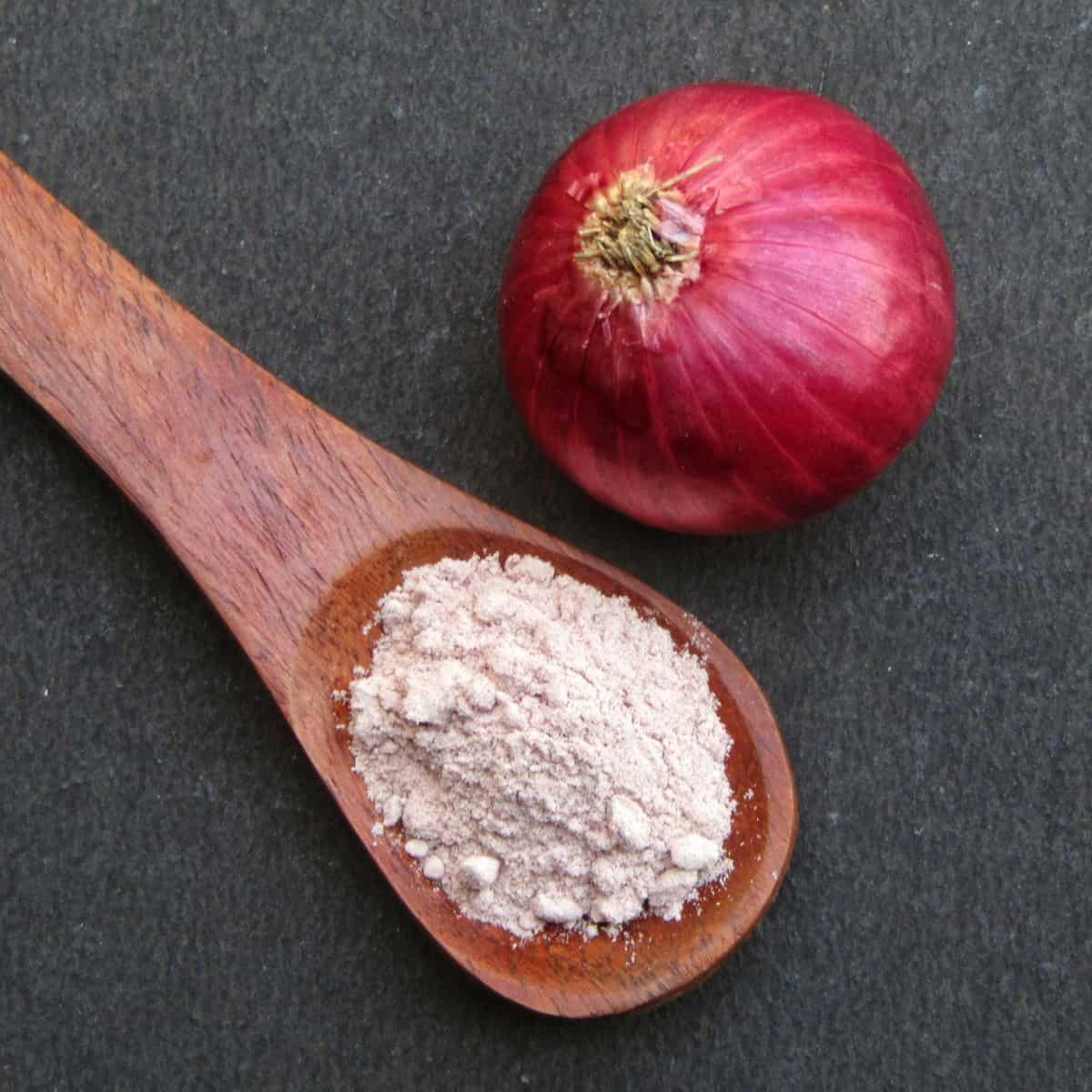
An onion powder substitute is your best option when you suddenly run out of the spice while preparing your ingredients, cooking, or baking. While you can run to the nearest store to buy one, you aren’t sure if they currently have stock, as it’s one of the kitchen staples that get sold out quickly.
Fortunately, there are several substitutes for onion powder that you probably already have in the kitchen or can easily buy.
You are watching: 14 Best Onion Powder Substitutes to Have In Your Home
Jump to:
- 14 Onion Powder Substitutes
- Can I Substitute Onion Powder for a Whole Onion?
- Never Worry About Running Out of Onion Powder!
- Recipe
14 Onion Powder Substitutes
I have tried and tested many alternatives and found the following to be the best onion powder substitutes:
1. Granulated Onion
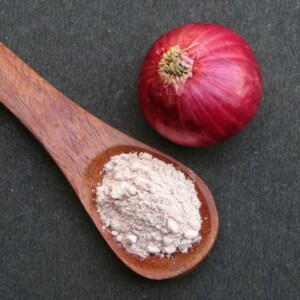
What could be the best onion powder substitute to give your dish the onion taste you’re looking for than granulated onion? What I love the most is there is no need to make any adjustments to my recipe. One teaspoon of onion powder equals a teaspoon of this great substitute.
Like onion powder, granulated onion is produced using dehydrated onions and then finely ground. The only difference is that the powder version is finer than the granulated one.
Best for just about anything!
2. Onion Flakes

Onion flakes are the best substitute for onion powder in terms of flavor because it’s also made from dehydrated onions. Although they’re bigger and less refined than onion powder, onion flakes will melt quickly when you start cooking them once added to hot dishes.
You can turn them into powder if you’ll use dried onion flakes to flavor cold dishes without the added texture they bring. Your mortar and pestle is your best tool to make fine powder if you use a pressing and twisting motion rather than merely pounding the onion flakes.
You can also use your blender, food processor, spice grinder, and even your coffee grinder, but expect to have coarsely ground powder. Simply put the right amount in the appliance and pulse it for a few seconds.
When using onion flakes as your substitute onion powder, you also won’t need to adjust the amount you need to use. Whether it’s in flake or powdered form, the ratio is 1:1.
However, dried onion flakes will absorb more liquid than onion powder because of their bigger sizes. So make sure you constantly check the food you’re cooking to know if you need to add more water or oil.
Best for casseroles, salads, and stir-fries.
3. Dried Minced Onion
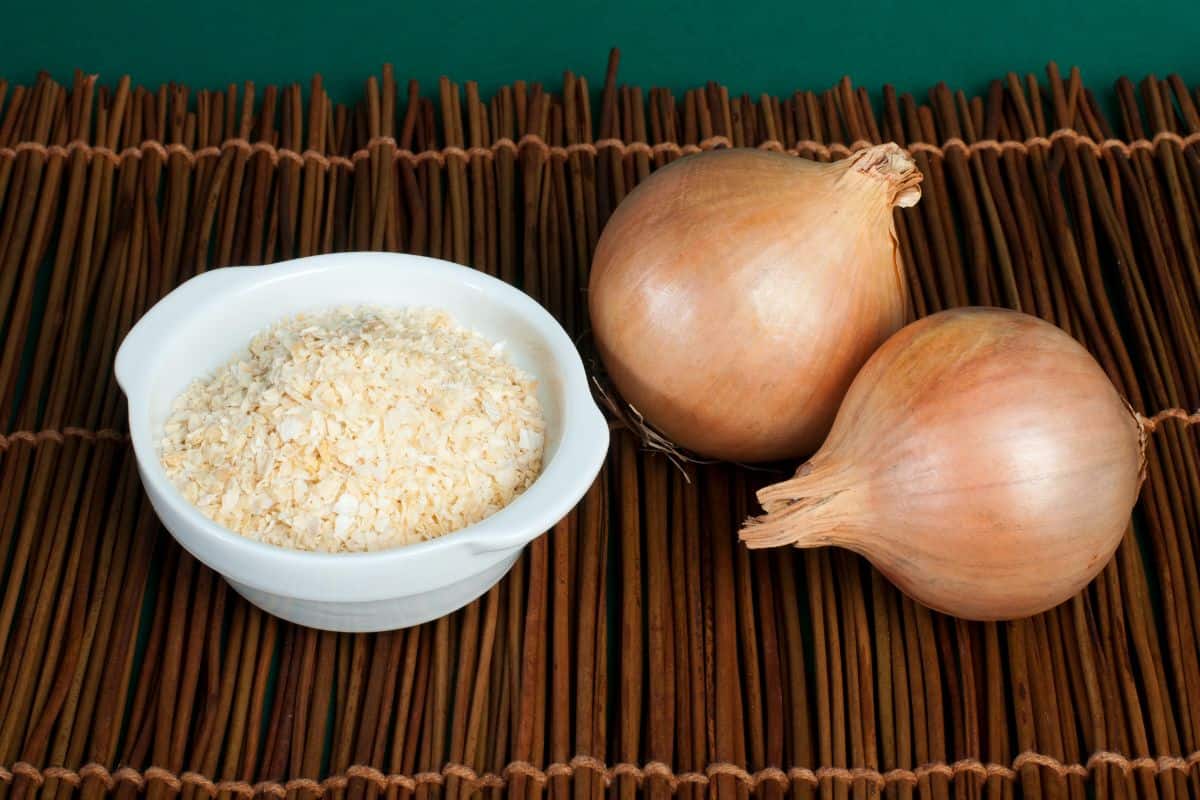
Like onion flakes, dried minced onion is just dehydrated onion that has been minced to perfection, preserving its flavor and color. The only difference is that it has smaller sizes than onion flakes, making them easier to work with.
When substituting onion powder with dried minced onion, simply follow the same ratio as onion flakes. Likewise, you can turn it into a powdered version with the help of your handy kitchen appliances.
Best for dips, sauces, casseroles, stews, soups, and salads.
4. Onion Salt
Aptly named, this excellent substitute is basically onion powder with salt, so it has a similar flavor but is a bit salty. Thus, it isn’t the best onion powder substitute for those following a strict diet.
That said, adjust the amount of salt your recipe needs when using onion salt as a substitute. But if you want to be sure you don’t serve salty food, I highly recommend adding half the amount of the required onion powder and then just adding more when needed.
Best for just about any baked goodies, savory dishes, marinades, sauces, and spice rubs.
5. Onion Paste

Onion paste is an onion powder substitute for onion-flavored dishes that you can purchase at the store or make on your own. I prefer to prepare it at home because it’s the best way to put my unused, cut onions that have been sitting in my fridge to good use.
It’s also easy to prepare! All you have to do is puree fresh onions by placing your chopped onions in your blender or food processor. Pulse for a few seconds until it has a smooth paste consistency.
Now, add it to your recipe to give it its much-needed onion flavor!
Note that you need to use more onion paste than onion powder because it has a milder flavor. The highly recommended ratio is 1 tablespoon for every 1 teaspoon of onion powder.
Read more : How to make Marvelous Jam in Disney Dreamlight Valley
What if you have leftover onion paste? You can place it in a jar and store it in your fridge for one week.
You can also put one tablespoon of your onion paste in each cube of your ice cube tray, cover it with plastic wrap, and then freeze it. Once frozen, I suggest removing the frozen paste from the tray and transferring it to a Ziploc bag for easier access as and when you need onion paste.
Best for any vegetable and meat dishes, soups, stews, and spice rubs.
6. Garlic Powder

The last thing that comes to mind when asking, “What can I substitute for onion powder?” is garlic powder. It’s a whole new different vegetable, after all.
But some of you probably know they belong to the same family or genus. That’s why garlic powder can give your dish its needed pungent flavor and aroma.
When using it as an onion powder substitute, use half the amount you need because garlic is far more potent than onion.
Best for baked dishes, soups, stews, and spice rubs.
7. Garlic Salt
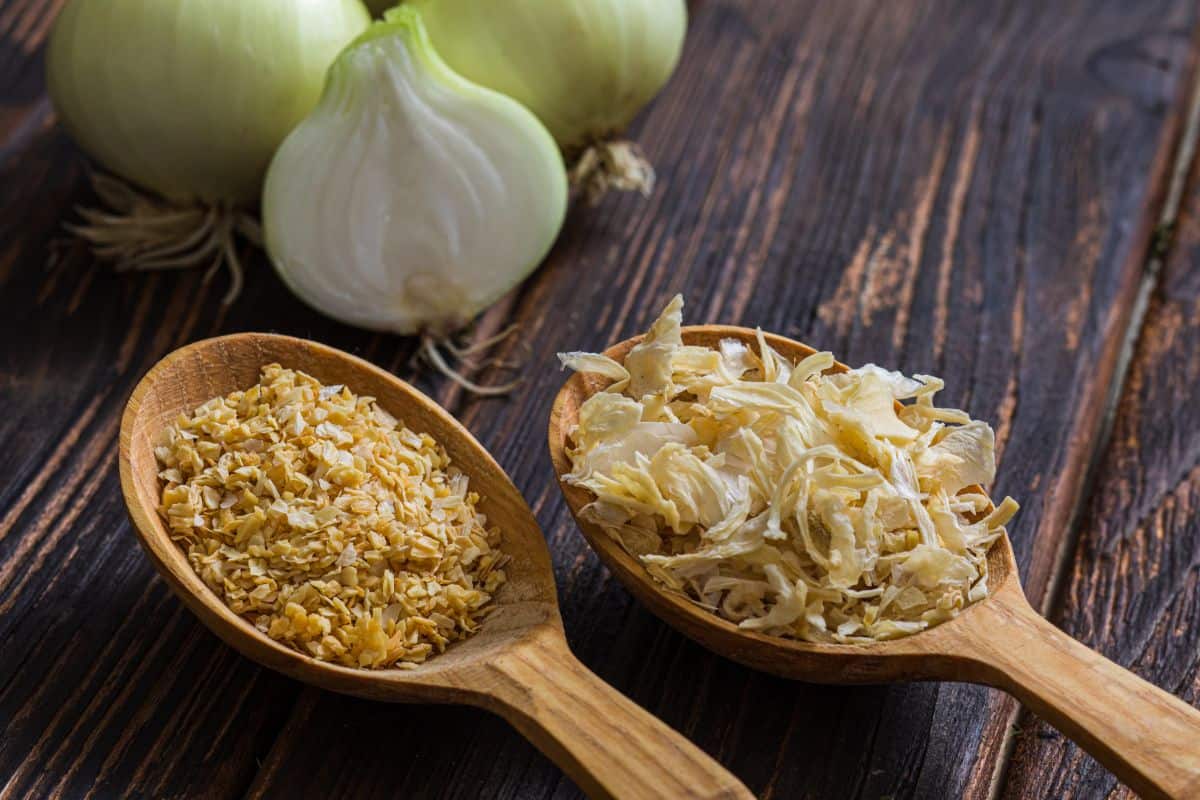
Like onion salt, this substitute is garlic powder with added salt, so avoid using it if you need to limit your sodium intake. If you use it in your recipe, follow a 1:2 garlic salt to onion powder ratio.
It means that if your recipe calls for one teaspoon onion powder, you must only use half a teaspoon of garlic salt.
Best for rubs, casseroles, pasta, soups, and stocks.
8. Green Onions

One of the best fresh alternatives to onion powder is green onions, also known as spring onions and scallions. You can serve them raw or cooked, so you can add them to different recipes.
While you can use both the green leaf and the white bulb, I highly suggest only using the bulb if you want more onion flavor.
Note that green onions are basically baby onions, so they have a more subtle flavor than onion powder. So when using it as an onion powder substitute for onion-flavored recipes, you need to add three to four times more than when using onion powder.
You must also remember that green onions won’t stay fresh long. Hence, make sure you only buy what you need to avoid ingredient wastage.
Best for dips, pizza, pasta, salads, soups, and savory dishes.
9. Shallots

Often confused with fresh onions, shallots have a taste that combines garlic and onion flavor with a bit of a unique sweetness. Mince or grate this vegetable before using it as a substitute for onion powder.
Since it has a milder flavor than onion powder, you need to use more minced or grated shallots. The ideal ratio is substituting one tablespoon of onion powder with two tablespoons of shallots.
Best for casseroles, stir-fries, tacos, and salads.
10. Leeks
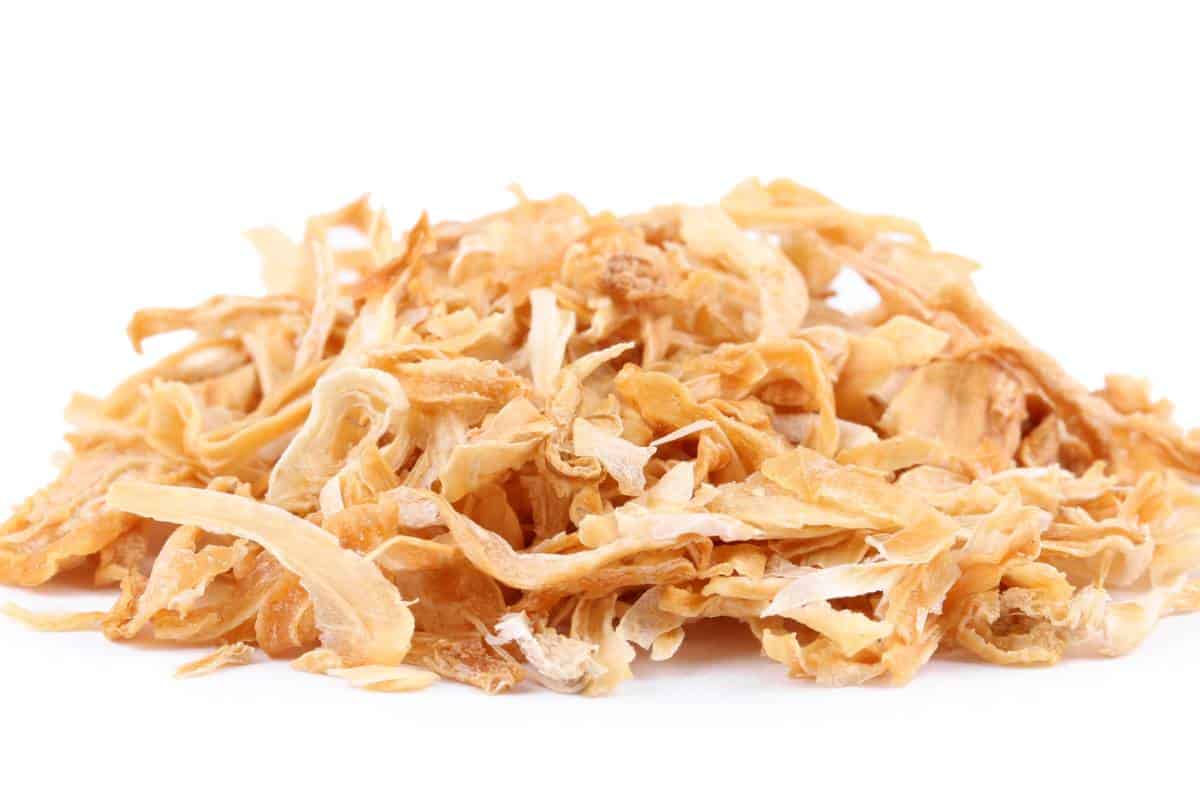
This great substitute for onion powder looks a bit like green onions but is longer and larger. It is less pungent than fresh onions and onion powder and has a somewhat sweetness.
Thus, to replace onion powder with leeks, you must use a cup of raw chopped leeks for every teaspoon of onion powder your recipe requires.
Best for stews, soups, and salads.
11. Chives

Another of the best fresh alternatives to onion powder belonging to the same family as onions that requires your chopping skills is chives. However, unlike leeks and scallions, chopped chives are best used raw because they tend to lose their flavor when cooked.
With their mild onion-like flavor, you will need more chopped chives than your recipe requires for onion powder. Based on my experience of using it as an onion powder substitute, you will need four teaspoons of chives for every teaspoon of onion powder.
Read more : 3 Fast Ways to Make Your Own Recipe Cards
Best for cold dishes and salad dressings.
12. Fennel Bulbs

Fennel bulbs won’t surely cross your mind when seeking the answer to “What can you substitute for onion powder?” I was also surprised that its bittersweet, aromatic, strong flavor could give some dishes the much-needed flavor boost that onion powder does.
Since fennel bulbs are crunchy and large vegetables, you must mince them into small pieces and cook them. They also have high moisture content, so you need to reduce the amount of liquid you’ll use in your recipe.
In terms of ratio, use a teaspoon of minced fennel bulbs for every half a teaspoon of onion powder your recipe requires. Nonetheless, you can reduce this amount if you want to because the flavor profile of fennel bulbs isn’t for everyone or can be a bit too strong for some.
Best for chicken, fish, vegetables, meat, stews, and soups.
13. Celery Seeds
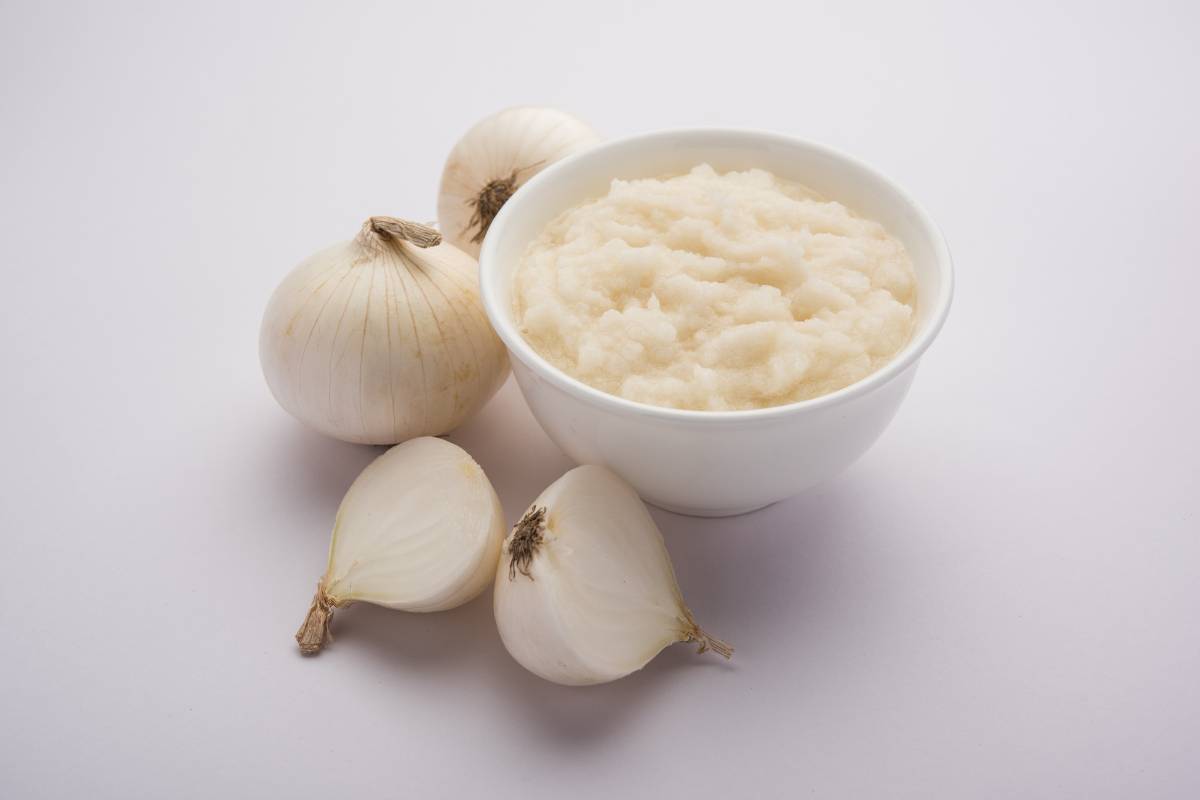
Another great substitute for onion powder that can give your dish the familiar pungent and earthy flavor is celery seed. It isn’t as flavorful as onion powder or fresh onion, but you don’t need to adjust the amount that your recipe calls for; one teaspoon of onion powder equals one teaspoon of celery seed.
Of course, you can always use more if you want a stronger flavor. It will help if you taste the celery seed first, especially if it’s your first time using it. This will help you decide how many seeds you want to add to your dish.
Best for stews and soups.
14. Seasoning Mixes With Onions

Now, what if you can’t find any of the best substitutes for onion powder I listed above and prefer not to use the fresh alternatives?
You can look into the seasoning mixes available in the grocery or the ones you already have in your spice rack.
Check out their labels and pick one with a good amount of onion powder or onion flakes in the mix. I also recommend picking a product that includes one or two of the fresh onion powder substitutes above. This will ensure that you give your dish the best onion and onion-like flavor profile it needs.
These commercially prepared mixes have richer flavors than your onion powder, so you will surely have a flavorful dish. When I use any of them, I follow a 1:1 and 2:1 (seasoning mix: onion powder) ratio, depending on the herbs and spices included in the product.
So, go ahead and taste the seasoning mix before even using it to have a good idea of the perfect ratio to use. Otherwise, you can follow the 1:1 ratio and add as and when needed.
Best for just about anything!
Can I Substitute Onion Powder for a Whole Onion?
With a long list of onion powder substitutes, you’re probably wondering why I didn’t include minced or chopped fresh onions.
Definitely, they’re the most obvious onion powder substitute, but using them will require tricky adjustments in cooking temperature and time. We all know that minced or chopped fresh onions easily burn, which can change the taste of your dish to a whole new level.
Plus, it could give your dish a certain crunch that the recipe doesn’t need or that you (and even those who will eat it) won’t like.
But if you really want to use it, use your freshest red, white, or yellow onions to mimic the more concentrated flavor of onion powder.
You must also remove as much moisture as you can by placing your sliced onion on a paper or kitchen towel. This way, you don’t have to make a significant adjustment to your recipe’s liquid content.
Pro Tip: Adding a bit of salt to your freshly chopped or minced onion is one trick I have tried to add more flavor and remove more moisture.
In terms of ratio, I highly suggest that you follow 1:1 and adjust accordingly to achieve the taste you’re looking for.
Best for savory dishes.
Never Worry About Running Out of Onion Powder!
That’s it! From commercially available onion powder substitutes to fresh vegetables and homemade onion powder, you won’t run out of options to whip up a flavorful dish or baked goodie.
Recipe
Source: https://gardencourte.com
Categories: Recipe

